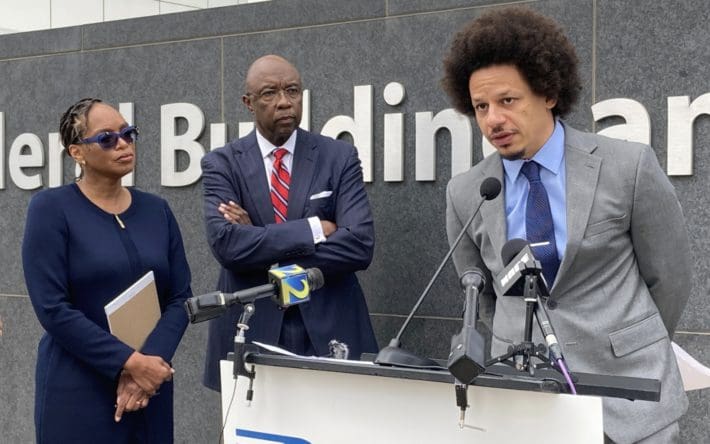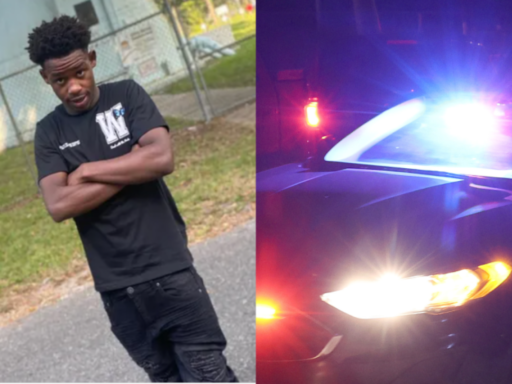
Eric André has filed a lawsuit against Clayton County over police’s “program of racial profiling and coercive stops” at the Hartsfield-Jackson Atlanta International Airport.
via: Rolling Stone
The lawsuit, filed in federal court Tuesday, Oct. 11, is focused on the so-called “jet bridge interdiction” program at Atlanta’s Hartsfield-Jackson International Airport. As the lawsuit notes, the program allows Clayton County cops and district attorney’s office investigators to wait in the jet bridges (the boarding tunnels that connect gates and planes) and “selectively intercept passengers… interrogate them before the board their flights, and search their carry-on luggage, all in the name of combatting drug trafficking.”
The lawsuit continues: “[Clayton County Police Department] calls these stops ‘consensual encounters’ and ‘random.’ They are neither; the CCPD jet bridge interdictions rely on coercion, and targets are selected disproportionately based on their race.”
In an interview (via The Associated Press), André said he felt a “moral calling” to file the lawsuit “so these practices can stop and these cops can be held accountable for this because it’s unethical.” He added, “I have the resources to bring national attention and international attention to this incident. It’s not an isolated incident. If Black people don’t speak up for each other, who will?”
A spokesperson for the Clayton County Police Department said it had “no comment in reference to pending litigations.”
Both André and English were stopped and searched in separate incidents about six months apart. English was stopped on Oct. 30, 2020, while flying from Atlanta to Los Angeles. According to the lawsuit, he was confronted by two plainclothes officers who showed him their badges and began “peppering [him] with questions about whether he was carrying any illegal drugs.” English — who’d already gone through regular airport security — repeatedly told the officers he wasn’t carrying any drugs, but the cops continued to question him; they also asked him to hand over his ID and boarding pass and searched his carry-on luggage.
“Throughout the interrogation, Mr. English’s fellow passengers continued to board the plane,” the suit reads. “As they squeezed and maneuvered around Mr. English and the officers, many of the passengers openly gawked at the interaction. Mr. English did not understand why he was being singled out for this invasive and humiliating experience, or why the officers seemed so concerned that he might possess illegal drugs.”
Several months later, on April 21, 2021, André was similarly stopped, questioned, and searched during a layover in Atlanta en route back to Los Angeles. (André publicly discussed his experience after it happened, prompting the Clayton County PD to rebuff his claim that he had been racially profiled.)
“In response to their repeated questioning, Mr. André consistently denied having any illegal drugs,” the lawsuit states. “He understood that he did not have any choice but to continue to reply to the officers’ questions, and that he was not free to leave the officers during the questioning… The experience was traumatizing, degrading, and humiliating.”
The lawsuit alleges that the two searches were not random but part of a larger pattern of systemically unfair and racially-biased searches. It claims that of the 378 passengers searched in jet bridges between September 2020 and April 2021, 56 percent of stopped passengers were Black; but considering only 8 percent of American airline passengers are black, the lawsuit notes, “the probability of this happening randomly is staggering: significantly less than one in one hundred trillion.”
Additionally, the lawsuit casts doubt on the effectiveness of the interdiction program, noting that during the same eight-month span, cops found fewer than 36 grams of illegal drugs and only brought charges against two passengers. The program was, however, successful in seizing over $1 million in cash from passengers via civil asset forfeiture.
“CCPD likely targets passengers based on race because of (1) the false stereotype that being Black is a proxy for drug trafficking, (2) the reality that Black individuals are less likely to have bank accounts and therefore more likely to carry assets as cash, and (3) the fact that Black individuals are, for good reason, more wary of engaging with the legal system to challenge a wrongful seizure,” the lawsuit claims.
Barry Friedman, one of the lawyers who filed the suit on behalf of André and English, said in a statement, “These are cases of flying while Black, plain and simple. Every day in America, people of color are unjustly stopped on the pretense that these encounters are consensual. It is humiliating, it is deeply inappropriate, it is unconstitutional, and it must stop.”





